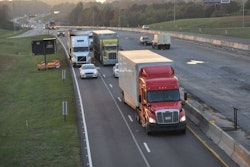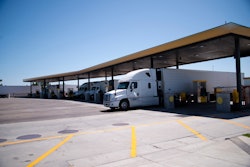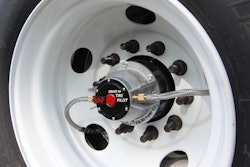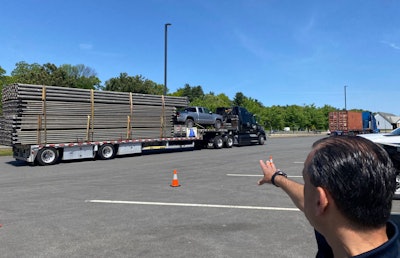
At the Clifton Park Rest Area off I-87 just north of Troy, New York, Jonathan Nicastro, director of the state's Motor Carrier Compliance Bureau, walked through how the Commercial Vehicle Safety Alliance's International Roadcheck inspection blitz was playing out in one of the biggest states in the nation -- also one of the most intense when it comes to inspections, measured per lane-mile of National Highway System in the state. (New York this year ranks No. 11 among the lower 48 states in Overdrive's annual inspection-intensity rankings: see chart below.)
For Roadcheck 2023, CVSA put the focus on load securement and antilock braking systems.
Nonetheless, Nicastro said the most common issue this year had been having a light out, yet many of those hadn’t even resulted in a violation. “If you have a license plate lamp out," for instance, that won't preclude you from getting a decal.
Despite some degree of leniency on less safety-critical components, the parts trucks on site on Thursday had plenty of work. Overdrive witnessed a trailer placed OOS for a brakes problem getting extensive work on-scene.
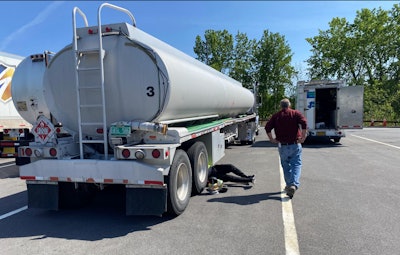 Here a mechanic replaces brake components on a trailer that was placed out of service.
Here a mechanic replaces brake components on a trailer that was placed out of service.
This year’s focus on ABS systems required inspectors to step up alongside a truck and watch for the light to come on as the driver turns the key. Nicastro said this was the most “over their shoulder” inspectors would get during Roadcheck, and they broadly tried to respect truck cabs as a driver’s personal space. Most often, Overdrive observed drivers removing and handing over an ELD tablet to inspectors or transferring data over the air, rather than a prolonged inspection in the cab with the driver.

Even still, inspectors do get a look inside, and what they see can set off some red flags. The presence of a “pee bottle” occasionally made itself known through its odor, and Nicastro said this can be a sign that drivers aren’t taking the proper breaks -- generally, though, he admitted it’s also just a symptom of life on the road and driver preference, and certainly not against the law.
Mostly, Nicastro said, operators keep a clean truck and cab for their own sake, and that any advantage that would have at the time of inspection would be a bonus.
On hours of service, Nicastro acknowledged New York City's truck parking shortage, but noted his people couldn’t always accept the “looking for parking” excuse when ELDs show them going over.
“Some excuses are valid, but if you’re going 30 minutes over, that’s going to be a violation with no civil or criminal penalty,” he said.
Load securement also shared the spotlight on Thursday, putting flatbedders in focus, but Nicastro said such haulers are “usually top of the line” when it comes to securement. Violations usually had to do with minor wear on straps rather than complete failures.
Nicastro joined state troopers and tax enforcement officers at the scene. Tax enforcers were going around making sure drivers had paid their highway use fee and IFTA. If a driver was found to have not been paying the use fee, tax officers would “help them sign up,” he said.
New York, as a border state and one with legalized recreational marijuana, sees some amount of narcotics trafficked in trucks, both in the trailer and cab. Nicastro stressed that no professional driver can possess marijuana in the cab, but also said that in almost every case where marijuana was discovered in a trailer, even buried in back of a sealed trailer, that the driver would get arrested.
“You can usually smell it,” he said. “We catch it all the time, even more now as it’s becoming legal” in several states. CDL drivers, subject to the FMCSA Drug and Alcohol Clearinghouse, he said, would be much less likely than non-CDL operations to be caught with drugs, however.
“Reefers running hard in the middle of winter can be a sign” of illegal drug trafficking, he said. So can reefers not running when the bill of lading lists meat or produce on the manifest.
Inspectors, of course, aren’t just out to keep an eye on Class 8 drivers, and one pulled in an unmarked hotshot with a 20-plus-foot trailer loaded with lumber for a closer look.
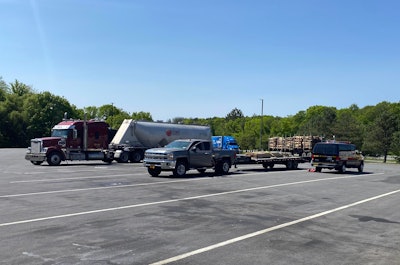 This unmarked Chevy got pulled in for an inspection. Commercial operation? Or just a homeowner hauling home some lumber?
This unmarked Chevy got pulled in for an inspection. Commercial operation? Or just a homeowner hauling home some lumber?
“He’s got no DOT number, no company name on the truck. Now this guy could just be building a shed in his yard, so our question will be to determine if he’s commercial,” said Nicastro. “Most likely, he’s working for a company.”
Nicastro said these smaller trucks and their operators sometimes drew the ire of professional long-haul Class 8 drivers as in some ways they’re operating on the honor system as to whether or not their operation is commercial. The honor system, that is, until they have to cross a scale.
Pulling up to the weigh station, I noticed a good number of trucks stopped off the road. Perhaps they were at their destination? Or: perhaps they were trying to avoid the blitz just one exit ahead. Nicastro said it most likely wouldn’t matter if they tried to avoid the weigh station, as he had “chaser” cars on the highway flagging down “bypassed” trucks that skipped the station.
[Related: The toughest states for load securement violations: Are you Roadcheck-ready?]
Pass the eye test, even during Roadcheck, and chances are you won't be pulled in
Ahead of Roadcheck, reporting from CCJ's webinar on preventive maintenance strategies to ace the inspection blitz saw Jeremy Disbrow, CVSA's roadside inspection specialist, say the quiet part out loud when it comes to inspections generally speaking: How your truck looks matters. As is the case every year, too, the OOS criteria got some slight advance tweaks and updates, this time mostly in favor of the driver.
While Roadcheck remains a more or less random sampling of trucks on the road for inspection, Disbrow said that inspectors do look for visible defects that might indicate a lack of pre-trip. Think missing reflector tape and lights.
In New York Thursday, May 18, for the most part the trucks looked good and passed through the weigh station without inspection. Nicastro explained he’s got maybe 10 inspectors, and the amount of time an inspection takes simply precludes most trucks from getting checked.
“Your chances of actually getting inspected are low, very low, but in the state of New York, you’re just as likely to get inspected last Friday or next Friday as [during] Roadcheck,” he said. “It’s probably foolish to try to sit out Roadcheck.”
That might be particularly so in a tough market -- Nicastro said he was aware operators are facing a bit of a downturn, likewise that truck parking, especially in New York City, can be hard to come by. “But we don’t look at the financial state of the industry,” he said. “We’re here to save lives” by removing dangerous vehicles from the road.
Another goal of Nicastro’s would be to ensure that “drivers don’t have to learn 50 sets of rules,” and to strive for inspections and enforcement to be uniform to help drivers set expectations.
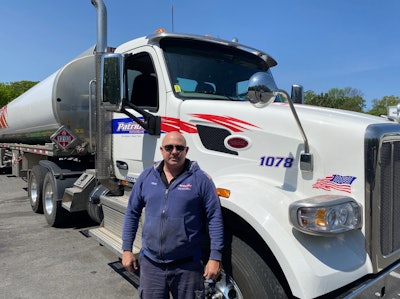 A proud driver stands in front of his daycab after getting the CVSA decal indicating a clean inspection.
A proud driver stands in front of his daycab after getting the CVSA decal indicating a clean inspection.
Throughout our visit to the rest area, Nicastro kept a laser focus on the 40,000-some traffic deaths last year and 5,000 or so of those that involved commercial trucks around the nation. Nicastro also sits on the board of the CVSA’s Operation Safe Driver, which takes a double-pronged approach to highway safety, reaching both professional drivers and educating the four wheelers on how to stay safe around big trucks.
He also took some time to directly address the drivers, specifically owner-operators, who sometimes describe enforcement actions like Roadcheck as little more than “cash grabs.”
“I don’t think we’ve written a ticket the whole” two-hour stretch I spent with him, he said. “We don’t get anything out of writing tickets here.”
Nicastro also executes a lot of New Entrant audits on motor carriers within the state, as many as 3,000 a year. On the issue of fraudulent and “chameleon carriers” plaguing the industry, he said New York has “data checks” in place to prevent people who previously had their authority revoked from getting authority again.
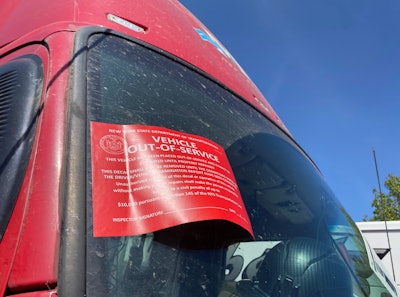 The dreaded OOS sticker sat on this truck for just a moment as a service truck made its rounds.
The dreaded OOS sticker sat on this truck for just a moment as a service truck made its rounds.
A sense of going above and beyond reverberated through the entire operation, as Nicastro saw it -- he said he was sending inspectors to CVSA’s national championship and hoped to have one of his subordinates crowned the country’s top inspector.
Like other inspectors we talked to, Nicastro expressed admiration for the wide majority of professional drivers and the pride they take in their work. Inspectors too, he said, must take their work home with them. “It’s not a full-time job, it’s three full-time jobs,” he said.
In that way, the inspectors relate to the drivers themselves. Though they occupy different positions, it could be argued they’re simply different components of a single system moving more than 70% of the country’s freight across the nation.
[Related: 'WTFFMCSA': Carrier mocking the FMCSA through its own registration system?]

